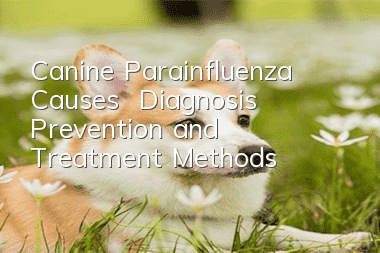Canine Parainfluenza Causes | Diagnosis | Prevention and Treatment Methods

Cause of canine parainfluenza:
The pathogen is parainfluenza virus, a subgroup of the family Paramyxoviridae, and its nucleic acid type is single-stranded RNA. , virus particles are polymorphic and generally spherical. The main route of infection is the respiratory tract. Respiratory secretions can infect other dogs through air dust, and can also be transmitted through direct contact. During the infection period, dogs may develop secondary bacterial infections due to reduced resistance. Newly purchased puppies are highly susceptible to the disease in stressful situations such as sudden changes in the environment, cold and damp conditions, overcrowding, sudden changes in temperature, etc.
Diagnostic criteria for canine parainfluenza:
The clinical manifestations of canine respiratory infectious diseases are very similar and difficult to distinguish. Cell culture is the best method for isolating and identifying canine parainfluenza viruses. In addition, retrospective diagnosis can also be made by using serum neutralization test and hemagglutination inhibition test to check whether the serum antibody titer has increased.
Prevention measures for canine parainfluenza:
For prevention, single vaccine or five-part vaccine can be used for vaccination. There is no specific medicine for treatment. It mainly focuses on symptomatic treatment and prevention of secondary infection. .
1. Prevent secondary infection: chloramphenicol 10-30 mg per kilogram of dog body weight, or tylosin 5 mg per kilogram of dog body weight, or tetracycline 7 mg per kilogram of dog body weight for intramuscular injection.
2. Antitussive: intramuscular injection of the antitussive aminophylline 10 mg per kilogram of dog weight.
3. Anti-inflammatory: Dexamethasone 0.25~2 mg per kilogram of dog body weight, 1 day.
4. Improve resistance: Give a large amount of vitamin C, 200~400 mg per day, to improve resistance.
Treatment methods for canine parainfluenza:
1. Hyperimmune serum can be injected into sick dogs. The intravenous drip of canine hemoglobulin can improve the dog's resistance.
2. Sick dogs with elevated body temperature can take antipyretic drugs orally. For sick dogs with severe cough, you can use Huatan and Zhicough Granules to alleviate the condition. When using traditional Chinese medicine, you can choose antiviral oral liquid, Shuanghuanglian, isatis root, etc.
3. When dogs are infected with canine parainfluenza virus, they are often secondary infected with Bordetella bronchiseptica, mycoplasma, etc. Therefore, antibiotics should be used to prevent secondary infections, so as to alleviate the condition and promote the early recovery of sick dogs.
- How to feed a healthy dog?
- Will Alaskan dogs shed hair in winter? What are the reasons for dog hair loss in autumn and winter?
- What’s going on when your dog’s stomach growls?
- What is the reason why dogs don’t poop?
- How to protect dogs’ food and how to correct it
- Can Alaska be trained to pick up things with its mouth? Alaska Behavior Training!
- What causes dogs’ eyes to be red?
- Does a dog do something wrong and need to be severely punished?
- Why do dogs suffer from skin diseases?
- Things to consider when choosing puppy food



